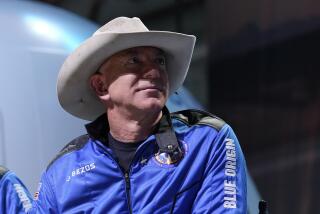‘Yawns’ equate frugality with morality
- Share via
SAN FRANCISCO — They drive hybrid cars, if they drive at all, shop at local stores, if they shop at all, and pay off their credit cards every month, if they use them at all.
They may have disposable income, but whatever they make, they live below their means, in a conscious effort to tread lightly on the earth.
They are a new breed of Gen Xers and Ys, Young and Wealthy but Normal, or Yawns.
The acronym comes from the Sunday Telegraph of London, which noted that an increasing number of rich young Britons are socially aware, concerned about the environment and given less to consuming than to giving money to charity.
Yawns sound dull, but they are the new movers and shakers, their dreams big and bold. They are men and women in their 20s, 30s and 40s who want nothing less than to change the world and save the planet.
Take Sean Blagsvedt, who moved from Seattle to India in 2004 to help build the local office of Microsoft Research. Moved by young children begging on the streets, Blagsvedt quit Microsoft and launched two networking sites, babajob.com and babalife.com, to link India’s vast pool of potential workers with the people who need labor. The larger goal -- to reduce poverty.
Far from the techie cafe life, Blagsvedt, 32, lives at Babajob’s headquarters in Bangalore, a 3,000-square-foot apartment where his mother and stepfather also live and 15 workers come and go every day.
“I’m a happy person,” he said. “It’s great to do something that you believe in doing.”
The high-tech world has spawned some Yawns, but they can sprout anywhere. In fact, Yawns are a subset of a growing global movement of the eco-socially aware. The state of the economy and the state of the planet have inspired people to consider what they buy and how they spend in ways not seen since the “Small is Beautiful” and ecology movements of the 1970s.
The movement makes perfect sense, said David B. Grusky, a sociologist at Stanford University, because society tends to follow cycles -- with anti-materialist periods like the hippie movement generating a pro-materialist reaction -- the yuppie period, and so on. Not to mention, he adds, that the evidence of major climate change and a concern with terrorism gives rise to more interest in spiritual as opposed to material objectives.
The upshot, he said, is that “a cultural and demographic ‘perfect storm’ may well push us decisively toward an extreme form of post-materialism in the upcoming period.”
That helps explain why Earth Day has become so big again, why more products are going green and why freecycle.org, an Internet community bulletin board where members offer items for free, has grown in five years from a dozen members in Tucson to a network of more than 3,000 cities in 80 countries.
Deron Beal, the site’s founder, counts 4 million members, and growing by 20,000 to 50,000 members each week.
“People have many reasons for freecycling,” said Beal. “But the biggest reason is environmental -- reusing and recycling instead of helping create more waste.”
Could it also be that we are sick to death of buying stuff?
Pam Danziger, a consumer trends expert, thinks so. “The green thing is just a small part of it,” said Danziger, whose firm, Unity Marketing, has new research showing luxury spending is way down. “Americans have been on a buying binge for the last 10 years,” she said. “Our closets are full. Our attics are full. Our garages are full. Enough already!”
Yawns live small, but they already own whatever they want.
Rik Wehbring, a 37-year-old dot.com millionaire who worked for multiple start-ups, limits himself to living on $50,000 a year.
That’s not chump change but well below what he could spend in San Francisco, where his rent eats up 40% of his allotted spending. Wehbring doesn’t own a television, his mp3 player cost $20 (“and it works just fine”) and he drives (when he drives) a Toyota Prius.
He buys most of his food from local farmers’ markets, is leaving the bulk of his estate to various environmental organizations and donates money to what he considers worthy causes. Every day, he grapples with “how to live a low-carbon life.”
Wehbring doesn’t buy clothes, or much of anything.
“I don’t need a lot of material possessions,” he said. “I haven’t had to buy anything in a while.”
Such frugality seems to run in his circle.
Brad Marshland, 44, the husband of Wehbring’s cousin, is a successful filmmaker living near Berkeley. He and his wife and two sons, ages 10 and 12, dry their clothes on a line, grow their own vegetables and buy what they need at garage sales and second-hand stores. (Second-hand stores are to Yawns what The Gap was to Yuppies.)
“We’re pretty low on the stuff scale,” Marshland said.
Marshland offsets his family’s “carbon footprint” -- how much energy it uses -- by donating money to environmental groups online.
Yawns hate ostentation.
When Ray Sidney, a software engineer at Google, cashed in his stock options in 2003, they yielded him more money than he could ever burn through in his lifetime. (Billions? He won’t say.) But instead of building himself a 10,000-square-foot mansion in the Googledom of Silicon Valley, he retired to a four-bedroom house in Stateline, Nev., and started giving money away.
He has given $400,000 to a local arts council to help build a new arts center, $1 million to a bus company to help launch a route so that casino workers wouldn’t have to rely on private transportation to get to and from work, and $1.7 million for a new football field and track at a local high school.
Sidney also donates millions to charities that try to cure diseases or save the world.
His one rich-guy, carbon-hogging guilt trip: a single-engine plane he flies about once a week to see his girlfriend in San Francisco.
But his pet project these days is pure Yawn. He is building what he calls “an environmentally friendly affordable housing development” on 100 acres near his home in Stateline.
“This world and our society and the people in it are good and worthwhile,” he said, by way of explanation, “and I think it’s worth spending money to keep it around and try to improve it.”
More to Read
Sign up for Essential California
The most important California stories and recommendations in your inbox every morning.
You may occasionally receive promotional content from the Los Angeles Times.













